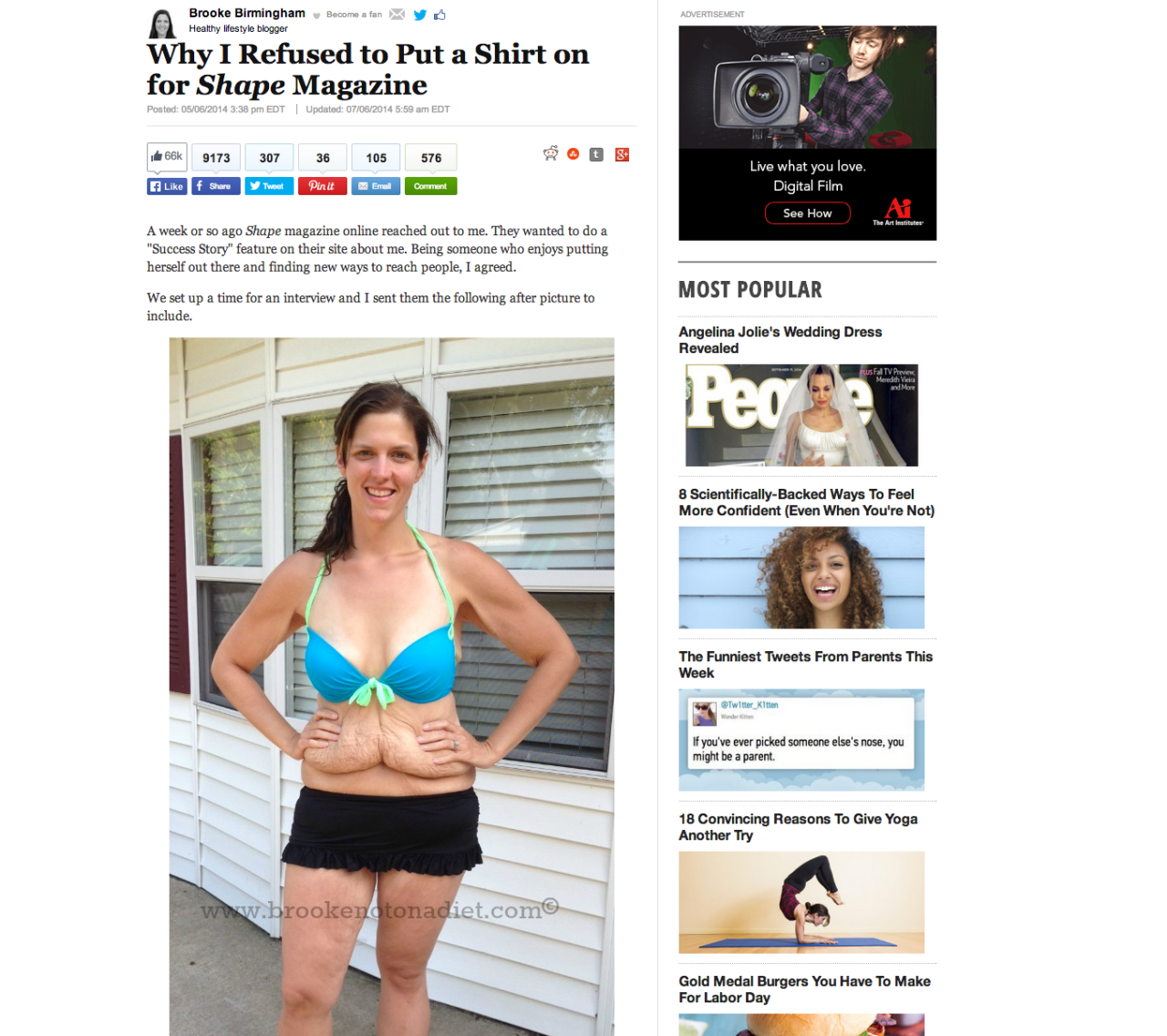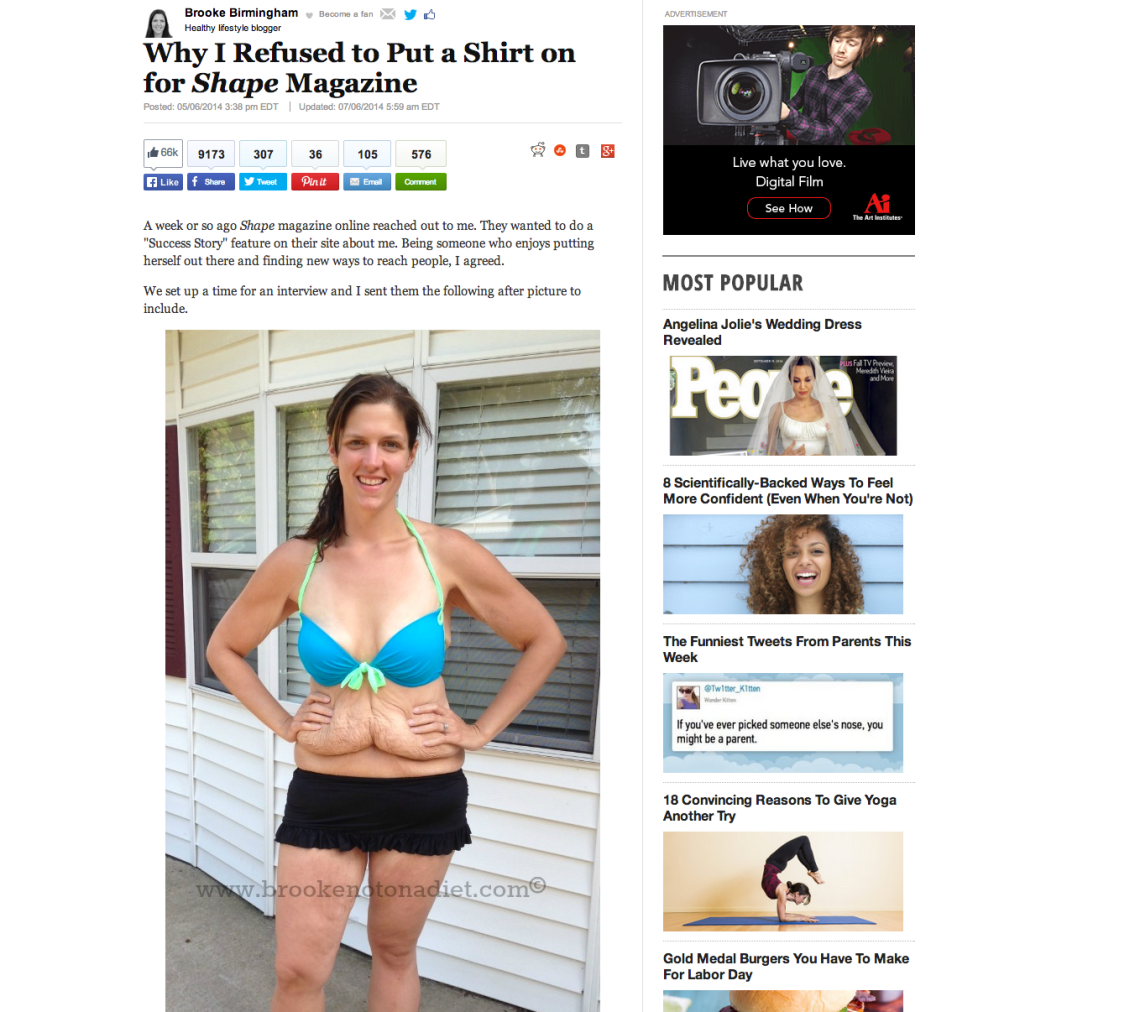
This Is What A 100-Pound Weight Loss Really Looks Like
These pictures don’t show the stretch marks, the sagging skin, and the stalled metabolism that accompany extreme weight-loss.
By Eva Harder

I recently read about the 172-pound weight loss after photo that Shape Magazine refused to publish, because the picture revealed too much loose skin. As someone who’s lost roughly a hundred pounds herself, I can relate to how frustrated I’ve felt looking at the before and after photos in fitness magazines. These pictures don’t show the stretch marks, the sagging skin, and the stalled metabolism that accompany extreme weight-loss. And they don’t begin to convey the severe psychological struggles that come with seeing such a major part of yourself melt away, and the never-ending, exhausting battle to maintain your new identity.
When I’m waiting for the metro after work, for example, I run through everything I ate that day. Sometimes I’m making sure I won’t feel guilty for eating dinner, but mostly I’m just checking, reassuring myself that I didn’t do anything wrong. My go-to distraction at work usually isn’t Buzzfeed—instead, I google pictures of celebrities and the measurements of their waists. I hate math, but every day, my head swims in numbers. I’m an expert at calculating how many calories my body burns at rest, how many reps and sets I still need to complete. My BMI. My hip-to-waist ratio. My body fat percentage. These are the numbers with which, for far too long now, I have measured my worth.
This is the healthiest my body image has ever been.
About a year and a half ago, I couldn’t order a third drink at a bar without worrying I would break down crying at the end of the night; if I was sober, I could ignore the voice that said people were only humoring me by hanging out with me, that underneath they just pitied me for being too big. But if I had too much to drink, those thoughts broke through and threatened to drown me. Even two years after the weight came off, the voice that reminded me how much weight I still needed to lose before I would be beautiful and successful, even lovable, was louder than the rationale of my friends, family, and the part of myself that’s an adult, educated woman who knows she should be above it all.
At times, I love my body. I like that I’m not small or skinny. I like my boobs, my quads. I feel feminine and strong, and I want other people to appreciate my body as much as I do. Even though I’ve never been able to run without jiggling or wear shorts without fidgeting, there’s a very basic, immutable part of me that likes it this way; this has been my identity my entire life. And besides, why should I give in? I want to be beautiful because of who I am, not what I weigh.
And then, of course, much of the other time, I imagine a laser or knife coming in and stripping me of all this excess. My hips, my thighs, everything disappears and diminishes enough for me to run fast and far, for me to walk around the office comfortably in a pencil skirt and go for a swim in the summer without feeling ashamed.
At the start of last summer, that rational part of me, the part that celebrates my body instead of condemning it, became stronger. It finally dawned on me, like an epiphany, that maybe I shouldn’t actively tell myself how fat I am and how I’m not good enough. For the first time in my life, I started to police my thoughts. I started to accept that I will never be, much as I’ve tried, perfect—or at least our culture’s version of it.
But even as I worked on scaling back the self-loathing, I continued to diet and workout obsessively, telling myself that I was only working toward becoming more fit, even more healthy. But the harder I worked, the more my body resisted. After months of intermittent fasting, carb-cycling, calorie counting, and multiple trips to the gym in a single day, I’ve harmed my metabolism to the point that I’ve gained at least 30 of the lost pounds back. My body is so worn down that I’ve been battling chronic fatigue and sickness for months, to the point that I struggle going to work most days, much less making it to the gym.
This loss of control hasn’t sent me into the kind of hysteria and depression it would have a year ago, but in the last few months, I’ve still cried after coming across a photo of myself tagged on Facebook. I’ve canceled plans with friends at the last minute solely because I thought everything I put on made me look fat. I continue to avoid cameras and mirrors in dressing rooms, and I must always, always monitor the voice in my head that threatens to remind me how much skinnier my friends are, the one that resents my closest friends for getting a burger while I order a salad, the one that says your coworkers don’t respect you because of this, this is why he wasn’t interested.
Mostly, this voice is gone. In fact, I’m astonished that it’s remained as quiet as it has. I keep waiting for it to show up, to remind me, resolutely and with a sigh, that I’m not good enough, that I need to skip dinner, that I need to work-out longer, even if I’m sore and exhausted and can barely walk. Sometimes, I miss that voice, because it’s the thing that helped me lose a hundred pounds. It’s what got me through the entire weight-loss process, which is the hardest thing I’ve ever done. Which I just can’t bear the thought of going through again.
Even as I learn to accept myself, I’m afraid that loving myself too much means that I’ll lose the discipline and the vigilance to change myself. I’m afraid of disappointing the people who were so proud of me for losing all that weight three years ago, who only seemed to see me once so much of me disappeared.
Deep down, I know that this other part of me, the owner of the voice I’ve listened to for too many years, doesn’t even want me to reach the number society says is ideal. Because what would be left for her to hate then?
People love to hear about dramatic weight-loss stories, and no one ever shied away from telling me how much better I looked once the weight came off. But what I’ve described here is what it really looks like to lose a hundred pounds. This is what it’s like to be a woman who sees proof, all around her, every day, of how much she’s lacking and what she should be, what she could be, if she tried just a little harder.
This is how millions of women in this country feel. Millions of beautiful, smart, capable and accomplished women, who can lose every sense of what matters to them and what makes them matter just because they’re a 10 instead of a 4.
It’s insanity. Perfect is such a boring adjective, and it’s the least noble or courageous goal we could ever aim for.
As long as we live in a place where the best thing we can be as women is beautiful, the least we can do is redefine beauty—to see it not in how much we weigh or how we look, but find it instead in how often we laugh, how much we help, and how much gratitude we feel not for what we’re lacking, but for everything we have, everything we already are, and every pulse that we’re lucky enough to still feel beating.
That’s the kind of image fitness magazines should publish. ![]()











